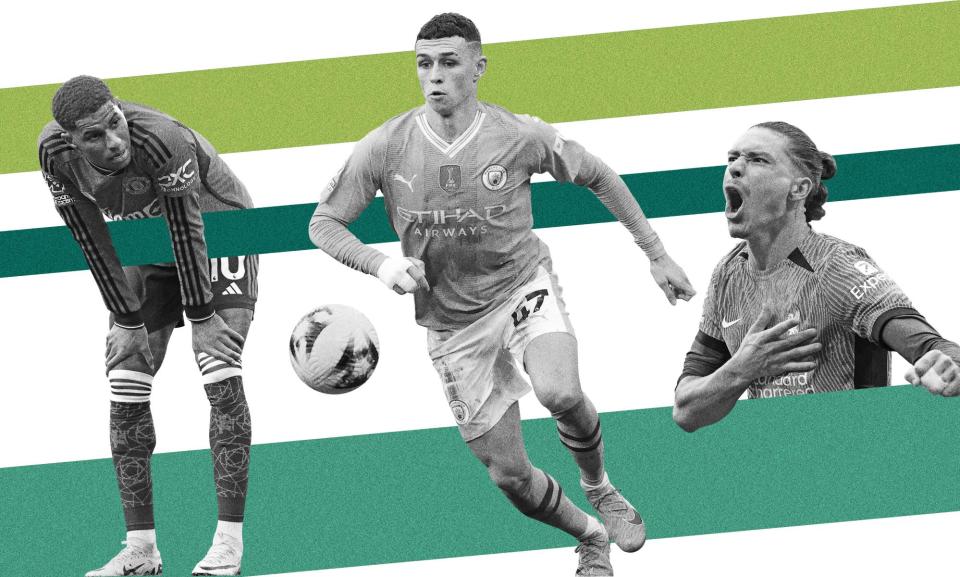Pep Guardiola has revived Barcelona spirit to boost City’s title chances

Manchester City, brilliant but oddly vulnerable; Manchester United, a mess but with the odd spark. It was, in the end, a Manchester derby that confirmed what we already knew. And the result is that the title race rolls on to Anfield on Sunday and, after four straight wins apiece in the league, a potentially seismic clash between City and Liverpool.
By that point, Arsenal will have played Brentford at the Emirates next Saturday. Of which there are two things to be said: first that after next weekend there will be 10 games remaining and there haven’t been three sides so tightly bunched at the top at this stage since 2010 (when after 28 games, Chelsea led United by a point with Arsenal two further back). And second, that if this is going to be a classic run-in, it needs the top teams to drop unexpected points, for there to be twists and turns, rather than the sort of procession of wins for the major contenders that characterised 2018-19.
United, meanwhile, are six points off fifth and, while they may have been ahead at half-time, the gulf between them and City is vast. Given their injuries, it’s perhaps not entirely fair to judge them on this one game, but it is reasonable to ask more generally why, having had more time than either Unai Emery at Aston Villa or Ange Postecoglou at Tottenham and having spent a lot more money, Erik ten Hag has been so much less successful at forging a side with a coherent structure and identity. Recruitment has been historically bad and he is due sympathy for that but, equally, he’s the one who looked at Antony and saw a £90m footballer.
Related: Premier League weekend awards: Liverpool’s secret weapon and Pochettino is a problem
Ten Hag’s setup was a return to the Ole Gunnar Solskjær days of a midfield diamond with split strikers, which made sense: the Norwegian’s record against City, against all big sides, was comparatively good; it was at constructing attacks against teams who sat deep against United that he struggled. Deploying the pace of Marcus Rashford and Alejandro Garnacho against a City defensive line that has leaked more goals to rapid counterattacks this season than any Premier League side other than Crystal Palace probably was the way United could get at City.
To the extent that it brought the opening goal – a majestic long pass from André Onana, Bruno Fernandes playing the target-man role with unexpected aplomb and Rashford arrowing a shot into the top corner – it worked. But thereafter Rashford was awful while United’s unfamiliarity with the shape was evident in their hesitancy. Gradually they were forced deeper and deeper, unable to get out, unable to mount the sort of counterthrust that might have threatened a second or stemmed the City tide.
City might not have equalised until the 56th minute or gone ahead until the 80th but there was never any real sense that United would get away with it.
It was two moments of brilliance from Phil Foden that decided the game but with him in exceptional form, plus Erling Haaland, plus Kevin De Bruyne, there is always the sense that, as well as being a relentless machine that overwhelms sides with their pressing and control of possession, City have the individuals who can turn games.
Related: Premier League: 10 talking points from the weekend’s action
In that sense they are, in spirit at least, a little more like Pep Guardiola’s early Barcelona than some of the sides with which they have won the title at City. There is also a feeling that because of the growing tendency to play direct to Haaland, which adds a fresh dimension to their attacking play, they are perhaps not quite so in control as earlier iterations. Guardiola once spoke of his sides needing 15 passes after regaining possession so they could set themselves to guard against the counter; that layer of protection has seemingly been lost as they have become more threatening in transition, hence the vulnerability to rapid breaks.
And that perhaps explains the feeling over the past couple of months, even as City have won 15 of their last 16 games, that they are not quite at their best, that they are not quite as intimidatingly remorseless as in previous seasons. There has also been a recognition that the fixture list has been unusually gentle. Sunday was the first time since they lost to Villa three months ago that they have played a side who began the day in the top eight in the Premier League.
The derby was supposed to be the start of a tough month that would define their season. Perhaps it will, but United at the moment are really no match for City. Liverpool, Arsenal and Villa in the next four weeks will represent far stiffer tests.
This is an extract from Soccer with Jonathan Wilson, a weekly look from the Guardian US at the game in Europe and beyond. Subscribe for free here. Have a question for Jonathan? Email soccerwithjw@theguardian.com, and he’ll answer the best in a future edition

 Yahoo Sport
Yahoo Sport 





































